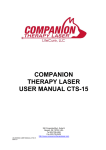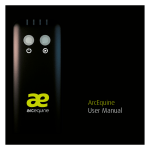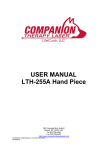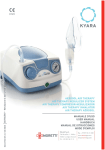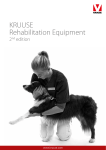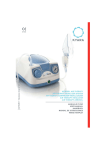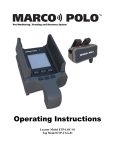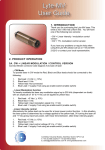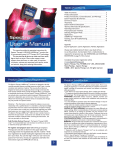Download COMPANION THERAPY COMPACT USER MANUAL CTC-12
Transcript
COMPANION THERAPY COMPACT USER MANUAL CTC-12 250 Corporate Blvd., Suite B Newark, DE 19702, USA Tel 302-709-0408 Fax 302-709-0409 http://www.companiontherapylaser.com LBL000045A USER MANUAL CTC-12 DCN: O Table of Contents 1. INTRODUCTION ................................................................................................................................... 2 1.1 Device Description .......................................................................................................................... 2 1.2. Usage Prerequisites ....................................................................................................................... 2 1.3. Protective Eyewear ......................................................................................................................... 3 1.4. Air Cooled Design ........................................................................................................................... 3 2. SAFETY ................................................................................................................................................. 3 2.1. Guidelines ....................................................................................................................................... 3 2.2. Laser Safety Supervision ................................................................................................................ 3 2.3. Warnings......................................................................................................................................... 3 2.4. Precautions ..................................................................................................................................... 4 2.5. Laser Safety Labels and Symbols .................................................................................................. 5 2.6. Safety Device Features .................................................................................................................. 6 2.7. Laser Eye Protection ...................................................................................................................... 8 2.8. Sources for Additional Information and Assistance on Laser Safety ............................................. 8 3. SYSTEM SET-UP .................................................................................................................................. 8 3.1. Unpacking ....................................................................................................................................... 8 3.2. Usage Prerequisites ....................................................................................................................... 8 3.3. Setup .............................................................................................................................................. 9 4. OPERATION ........................................................................................................................................ 13 4.1. Power On ...................................................................................................................................... 13 4.2. Protocols Screen .......................................................................................................................... 14 4.2.1. Choose Animal ............................................................................................................................. 14 4.2.2. Select Patient Characteristics ....................................................................................................... 15 4.2.3. Select Condition to Treat .............................................................................................................. 15 4.2.4. Operation Screen (Protocols) ....................................................................................................... 15 4.3. Operation Screen (No Protocol) ................................................................................................... 17 4.4. Setup ............................................................................................................................................ 18 5. Maintenance ........................................................................................................................................ 20 5.1. Maintenance and Calibration ........................................................................................................ 20 Specifications .............................................................................................................................................. 21 Treatment Information ................................................................................................................................. 22 Laser Cleaning Guide: Equipment Care ..................................................................................................... 25 Page 1 1. INTRODUCTION The COMPANION THEARPY COMPACT laser, Model Number CTC-12, is classified as a Class IV laser device. There are a variety of, therapeutic applications. The maximum output power is 12W. This laser device is sold solely for VETERINARY, INDUSTRIAL, OR SCIENTIFIC purposes only! Under NO circumstances should this laser system be employed as a medical device for human use. 1.1 Device Description The laser source of this device is a solid-state system. It produces near infrared laser energy at 980nm and 810nm wavelengths. The delivery system consists of a flexible optical fiber threaded through a lightweight hand piece. Activation occurs when the operator enables the laser by pressing the foot/finger switch. Releasing the foot/finger switch will deactivate the laser. Depending on laser system configuration, the foot/finger switch can function as on/off switch. A convenient and easy-to-use touch-screen display panel allows the operator to adjust or set laser output level with minimal effort. The laser can operate in continuous wave mode or controlled pulse mode. 1.2. Usage Prerequisites Every facility or institution utilizing this device is encouraged to adopt an ongoing Training and Safety Program. Such programs are outlined in the latest revision of the ANSI Standard Z136.3 for the Safe Use of the Lasers in Health Care facilities, as well as in standard training sections of Curriculum Guidelines. Page 2 RECOMMENDATION Individuals planning to use the COMPANION THERAPY COMPACT laser are actively encouraged to attend laser orientation and education sessions to achieve progressive levels of operational proficiency. 1.3. Protective Eyewear All Individuals present during the operation of this device must wear protective eyewear with an optical density of 5.0 or greater at 980nm and 810nm wavelengths. Protective glasses are included with the original purchase of this device. For additional pairs of protective eyewear, contact the LiteCure,LLC at 302-709-0408. CAUTION! DO NOT remove protective eyewear until the operator returns the laser device to Standby mode. To do this, the operator must release the foot/finger switch, touch the Ready screen button on the display panel, and visually observes the laser device returning to Standby. 1.4. Air Cooled Design The laser device is air-cooled and designed for use in indoor and outdoor environments. CAUTION! Place Laser Warning Sign at location entrance where people will use the COMPANION Therapy Laser device. 2. SAFETY This section provides a collection of safety guidelines and safety-related statements relevant to the safe and effective operation of the laser. Additional statements and protocols regarding safety appear elsewhere in this document. Use this laser device according to all printed guidelines cautionary statements, and protocols. 2.1. Guidelines Operator’s information is in compliance with section 1040.10 of Title 21 of the code of Federal Regulations, Chapter1, Subchapter J of Health and Human Services, Food and drug Administration, and center for the devices and Radiological Health. 2.2. Laser Safety Supervision Designate at least one person at each facility that utilizes this device as Laser Safety Supervisor, responsible for providing training on all operating safety procedures. 2.3. Warnings Please read and adhere to the following warnings: Note: If laser fails to operate properly, contact the LiteCure,LLC immediately at 302-709-0408. • This laser device is sold solely for VETERINARY, INDUSTRIAL, OR SCIENTIFIC purposes only! Under NO circumstances should this laser system be employed as a medical device for human use! • This laser device produces 980nm and 810nm laser energy that is invisible and can be an extreme hazard to the eyes of any living being. Irreparable corneal and/or retinal damage may occur if a person exposes one or both eyes to direct or indirect (reflected) laser energy. • IMPROPER USE OF SYSTEM CONTROLS or performance of procedures other than those specified in this manual may result in hazardous radiation exposure. • FAILURE TO COMPLY with all safety instructions and warnings may expose all participants to harmful levels of laser radiation and/or dangerous levels of electrical current. • NEVER direct the laser beam at anything other than the area being treated. Page 3 • NEVER allow the eyes of any living being to look directly into the distal end of a hand piece that is connected to an active laser device - WITH or WITHOUT wearing appropriate laser-emission protective eyewear. • DO NOT allow any reflective object to fall into or obstruct the path of the laser energy produced by this device. Scattered or reflected laser energy can cause serious damage to eyes and skin. The operator, all assistants, and the patient must remove all reflective objects (such as rings, metal watchbands, collars, tags, leashes and jewelry) prior to treatment with this device. • THERE ARE NO USER-SERVICEABLE COMPONENTS inside this laser device. Therefore, do not attempt to gain access to any internal device component. Doing so may cause serious and/or irreversible injury. • DO NOT remove protective eyewear until the operator returns the laser device to Standby mode. To do this, the operator release the foot/finger switch, touches the Ready screen button on the display panel, and visually observes the laser device returning to Standby. • AVOID THE USE of flammable anesthetics or oxidizing gases such as nitrous oxide (N2O) and oxygen. The high temperatures produced in normal use of the laser equipment may ignite some material, for example cotton or wool, when saturated with oxygen. Solvents, adhesives and flammable solutions used for cleaning and disinfecting should be allowed to evaporate before the laser equipment is used. 2.4. Precautions Please read and adhere to the following precautions: • Never allow untrained personnel to operate this device unless directly supervised by a properly trained and experienced individual. • This laser device produces 980 and 810 nanometer near infrared laser energy that is invisible and can be an extreme hazard to the eyes of any living being. Irreparable corneal and/or retinal damage many occur if a person exposes one or both eyes to direct of indirect (reflected) laser energy. • The protective eyewear supplied with this device has an optical density rating >5 at 980nm and 810nm and meets ANSI Z136.1 and Z136.3. All personnel present during device operation must wear protective eyewear. If needed, Contact the LiteCure,LLC at 302-709-0408 to purchase additional sets of protective eyewear. • DO NOT remove protective eyewear until the operator returns the laser device to Standby mode. To do this, the operator releases the foot/finger switch, touches the Ready screen button on the display panel, and visually observes the laser device returning to Standby. • Select a secure, properly equipped, and well-ventilated location in which to install and operate the laser. • Place “Laser in Use” signs at location entrances where people will use the laser device. • Always put the laser in Standby mode or switch the device off prior to connecting or disconnecting the hand piece. • Never leave this device in the READY mode unattended. • Turn the device off before moving, lifting or relocating the laser device. • Never press the foot/finger switch button without first verifying the safe orientation and proper positioning of the hand piece and ensuring compliance with all safety precautions. • During any laser procedure, do not allow any nonessential personnel into the treatment area. • If the laser fails to operate properly, contact the LiteCure, LLC immediately at 302-709-0408. Page 4 2.5. Laser Safety Labels and Symbols The following labels appear on the laser device. Manufacturer’s General Identification Label (See Figure) Located on the bottom of the device. The label displays the manufacturer, model number, serial number and date of manufacture. This label also contains various regulatory compliance declarations. General Safety Declaration Label (See Figure) Located on the rear of the device and warns of the radiation exposure hazard potential to eyes and skin. Optical Fiber Applicator Symbol (See Figure) Located close to the emission port on the bottom of the device, this symbol indicates that the laser energy emission occurs at the distal end of a properly connected hand piece. Warranty Seal Symbol (See Figure) Located on the bottom of the laser device in such a way that any attempt to open the panels of this device will break this seal. Remote Interlock Connector Symbol (See Figure) Located on the rear of the laser device, this symbol indicates the place of remote interlock connector. Page 5 2.6. Safety Device Features The device has specific safety-related features. All individuals who use this laser device should be familiar with the purpose and the operation of these features. Emergency Power Off Switch This switch is located on the front panel of the COMPANION LASER. Pushing the switch down terminates laser emission. To reset the Emergency Power Off Switch, the user must turn off the Power Switch on the rear panel and turn on again. Power Switch This switch is located on the rear panel of the COMPANION THERAPY COMPACT laser. Laser Fiber Connection Port and Finger Switch Jack This port is located on the bottom of the device. Laser can not emit without the fiber attached. A metal emission port dust cap which is permanently attached to the unit can be secured on the emission port when fiber is not connected. Fiber Connection Port Finger Switch Jack Page 6 Remote Interlock This device is equipped with a remote interlock located at the rear of the device. If the interlock is not inserted into the connector, all electrical power to the controls and laser components is terminated. The remote interlock MUST be inserted before the device can power on. System Power On/Off Visual Indicator Located on the front panel of the laser device, this yellow indicator is illuminated continuously whenever the device is on. Laser-Emission Indicator The laser emission indicator is located on the front panel. This yellow indicator is illuminuated whenever the laser emits. The LCD display during the emission mode. Internal Laser Energy Monitor There is an internal system that monitors the intensity of laser energy generated whenever laser emission occurs. If the laser emission is not within the system tolerance, laser emission will be aborted. If the laser device is unable to maintain the preset laser power output set by the user then the laser emission will be terminated. The laser system will automatically shut off when the emission output is out of the range of +/-20% of set value. The touch screen will display an error message. To reset the device the user is required to press the EXIT button when this error/warning message is displayed. on the touch screen Operation Errors 1) The device shall not leave STANDBY mode and enter READY mode and error message shall show if any of the following conditions occur. • Optical fiber is not properly inserted • Safety interlock is not properly installed • Foot/Finger Switch is depressed Page 7 2) Also, the device shall not keep in READY mode or EMISSION mode and error message shall show if any of the following conditions occur. • Optical fiber is not properly inserted • Safety interlock is not properly installed 2.7. Laser Eye Protection The protective laser eyewear supplied with this device has an optical density rating > 5.0 for 980 and 810nm laser emission. All personnel present during device operation must wear this eyewear. Contact LiteCure,LLC at 302-709-0408 to purchase additional sets of protective eyewear. 2.8. Sources for Additional Information and Assistance on Laser Safety Center for Devices and Radiological Health Office of Compliance 10903 New Hampshire Avenue Bldg. 51, Rm 5271 Silver Spring, MD 20993-0002 Phone: (301) 796-3100 Fax: (301) 847-8747 http://www.fda.gov Laser Institute of America 12424 Research Parkway, Suite 125 Orlando, FL 32826 Tel: 407 380 1553 Fax: 407 380 5588 http://www.laserinstitute.org/ 3. SYSTEM SET-UP 3.1. Unpacking Using the COMPANION THERAPY COMPACT laser packing list, unpack the device and its accessories from the shipping carton. Check for missing parts and inspect the unit carefully for damage such as cracks, dents or bent parts. If items are missing or any physical damage is apparent, please call LiteCure, LLC at 302-709-0408 for assistance. Notify the carrier if the damage appears to be the result of a shipping mishap. 3.2. Usage Prerequisites RECOMMENDATION Individuals planning to use the laser system should attend laser orientation and education sessions to achieve operational proficiency. Every facility or institution utilizing this device is encouraged to adopt an ongoing training and safety program. Page 8 3.3. Setup USB Port and Ethernet Port on the rear panel is for manufacturer use ONLY. DO NOT use them unless without LiteCure’s technician support. WARNING! DO NOT attempt to gain access to any internal device components. THERE ARE NO USERSERVICEABLE COMPONENTS inside this laser device. Doing so may cause serious and/or irreversible injury. CAUTION ALWAYS post Warning Signs for Class IV laser products. ALWAYS post Warning Signs in the area of the laser beam to alert those present. ALWAYS place “Laser in Use” signs at location entrances where people will use the COMPANION laser device. ALWAYS Turn the device OFF before relocating, lifting or moving this equipment. 3.3.1. Select a secure, properly equipped, and well-ventilated location in which to install and operate the laser device. 3.3.2. Ensure that the surface on which the device is placed will properly support the entire device. 3.3.3. Place within 6 feet of an available 100-240Vac electrical outlet. 3.3.4. Ensure adequate airflow around the device. The laser device is air-cooled and designed for use in a well-ventilated environment. 3.3.4.1. Select a flat hard surface (not a surface that will inhibit airflow through the bottom of the device). 3.3.4.2. There must be a minimum 4” clearance around the rear of the device. 3.3.5. Locate and uncoil the AC power cord. 3.3.6. Plug the Power Adaptor DC output connector to rear of the laser device. Plug the power cord into the AC input on the Power Adaptor. 3.3.7. Plug the male end of the AC power cord into a grounded electrical outlet. This should be only done last, after all hardware has been attached. 3.3.8. Connect the finger switch connector into finger switch jack on COMPANION THERAPY COMPACT bottom panel or connect the foot switch connector (if you have) into foot switch port on COMPANION THERAPY COMPACT laser rear panel. Page 9 Emission Port 3.3.9. Finger Switch Jack Remove the dust cap from the emission port DO NOT touch the fiber tip to any surface. If the fiber tip or the emission port is contaminated then the device might be damaged during laser beam output emission. Install the fiber optic into the emission port connector. Securely tightened the screw nut to the emission port. The fiber shall not be bent at a bend radius smaller than 5cm during the operation. Improper inserting, steeply bending and improper securing the fiber optic may lead to the damage to the fiber optic or delivery system and /or harm to the users. 3.3.10. IMPORTANT! Please DO NOT remove the fiber from the emission port once it has been secured for the first time unless the device is being packaged or transported to another location. Repeated insertion and removal of the fiber before and after every procedure will increase the chance of emission port and fiber tip contamination. If you must disconnect the fiber from the device then immediately attach the fiber tip cap. 3.3.11. Use Hand Piece Page 10 WARNING! DO NOT use Hand Piece without Hand Piece Head or inadequately secured Hand Piece Head on the Hand Piece Handle. Doing so may cause serious and/or irreversible injury. 3.3.12. Exchange Hand Piece Head. The Hand Piece Head is changeable. WARNING! ALWAYS Power Off in the device accordance with the User Manual before changing Hand Piece Head Remove Hand Piece Head from Hand Piece Handle, and DO NOT touch the distal of the Hand Piece Handle. Securely tighten the new Hand Piece Head to Hand Piece Handle. Page 11 WARNING! DO NOT use Hand Piece without Hand Piece Head or inadequately secured Hand Piece Head on the Hand Piece Handle. Doing so may cause serious and/or irreversible injury. WARNING! Wear Laser Safety Eyewear provided with the laser before operating the laser device. CAUTION Please do not remove the hand piece fiber from the emission port once it has been secured unless the device is being packaged or transported to another location. Constant insertion and removal of the hand piece fiber before and after every procedure will increase the chance of emission port and fiber tip contamination. If the emission port or the fiber tip is contaminated then the device might be damaged during laser beam output emission. The dust cap is installed by the manufacturer as a means to prevent dust and debris from contaminating the emission port during shipping and before device installation and is not intended as the primary means to protect the emission port connector during normal use. We recommend the following procedure: 1. Before using the device for the first time, install and secure the hand piece fiber in accordance with the User Manual. 2. Use the device as required. 3. When done using the device, power off in accordance with the User Manual and leave the hand piece connected. Bending Limits of the Hand Piece Cable: The radiation transferred within the hand piece cable goes through a very small diameter glass rod (an optical fiber). It can be damaged if bent too sharply. The maximum permissible bending radius of optical fiber is 5 cm. Laser Hand Piece Troubleshooting: If the any part of the hand piece assembly is overheating or producing smoke, then immediately power off device and discontinue operation. And then call LiteCure, LLC at 302-709-0408 immediately for assistance. Page 12 4. OPERATION WARNING! DO NOT use the System Controls or perform procedures other than those specified in this manual. Failure to comply may result in hazardous radiation exposure. FAILURE TO COMPLY with all safety instructions and warnings may expose all participants to harmful levels of laser radiation and/or dangerous levels of electrical current. AVOID THE USE of flammable solvents, anesthetics, oxidizing gases such as nitrous oxide (N2O) and oxygen or endogenous gases. The high temperatures produced in normal use of the laser equipment may ignite some material, for example cotton or wool, when saturated with oxygen. The solvents of adhesives and flammable solutions used for cleaning and disinfecting should be allowed to evaporate before the laser equipment is used. CAUTION Federal law (USA) restricts this device to sale by, or on the order of a licensed practitioner. NEVER allow untrained personnel to operate this device unless directly supervised by a properly trained and experienced individual. DO NOT leave the power switch on when not in use. Prevent unauthorized and/or unqualified use of the device as well as inadvertent laser emissions. DO NOT allow any nonessential personnel into the treatment area during any laser procedure. 4.1. Power On The initiation of the power-on sequence shall be accompanied by audible alerts, and then the PASSWORD Screen will be displayed. Type password: 1234 Page 13 Press the Enter Button to enter the HOME Screen (as below). 4.2. Protocols Screen button to enter Protocols Screen as below. Press 4.2.1. Choose Animal Choose the animal you wish to treat on the screen. The animal you choose is red highlighted as below, e.g., if Equine is chosen. Page 14 4.2.2. Select Patient Characteristics Choose the Body Type, Coat Length, Skin Color and Coat Color of the animal you wish to treat. After choosing the Body Type, Coat Length, Skin Color and Coat Color of the animal, the button is red highlighted. Click 4.2.3. button to enter Select Condition to Treat Screen. Select Condition to Treat Choose the condition of the animal you wish to treat. After choosing the condition of the animal, the Click 4.2.4. button is red highlighted. button to enter Operation Screen. Operation Screen (Protocols) NOTE: ONLY Power Setting can be selected by customer on Operation Screen (Protocols). Page 15 On the Operation Screen, press button or press the scale on the scale meter to set laser output power you desired. When button is pressed the unit sounds 6 beeps (6 seconds delay) and the STANDBY button correspondingly flashes to indicate that the laser is entering the Ready mode. When the beeping stops and the READY button is solid yellow, the laser is ready for emission. Also, when the beeping stops, the aiming beam is activated (if Aiming Beam setting is not Off in Setup Screen) and allows the operator to aim the red light onto the treatment site in preparation for the treatment. The device does not leave Standby mode to enter Ready mode, and error message will show on the screen if any of the following conditions occur. • Optical fiber is not properly inserted • Remote interlock is not properly installed • Foot/finger switch is depressed The aiming beam can be shut off by pressing either the button or READY button to exit Ready mode. In Ready mode, when press the foot/finger switch, the device enters Emission mode. The laser emission indicator flashes during laser emission. Page 16 4.3. Operation Screen (No Protocol) NOTE: ONLY Power Setting, Time Setting, Pulsed Rate Setting and Reset Joules can be selected by customer on Operation Screen (No Protocol). Press button on the HOME SCREEN to enter Operation Screen as below. On the Operation Screen, press button or press the scale on the scale meter to set laser output power you desired. On the Operation Screen, press On the Operation Screen, press button to set laser treatment time you desired. button to set laser treatment time you desired. When button is pressed the unit sounds 6 beeps (6 seconds delay) and the STANDBY button correspondingly flashes to indicate that the laser is entering the Ready mode. When the beeping stops and the READY button is solid yellow, the laser is ready for emission. Also, when the beeping stops, the aiming beam is activated (if Aiming Beam setting is not Off in Setup Screen) and allows the operator to aim the red light onto the treatment site in preparation for the treatment. Page 17 The device does not leave Standby mode to enter Ready mode, and error message will show on the screen if any of the following conditions occur. • Optical fiber is not properly inserted • Remote interlock is not properly installed • Foot/finger switch is depressed The aiming beam can be shut off by pressing either the button or READY button to exit Ready mode. In Ready mode, when press the foot/finger switch, the device enters Emission mode. The laser emission flashes during laser emission. indicator 4.4. Setup Press button on the HOME SCREEN to enter Setup Screen as below which can be used to change and Press Press (aiming beam flash frequency), (unit volume), (finger switch override) settings. button to exit the Setup Screen. button on Setup Screen to enter Aiming Beam Setup Screen as below: Page 18 Press button on Setup Screen to enter Unit Volume Setup Screen as below: Press button on Setup Screen to enter Foot/Finger Switch Setup Screen as below: Page 19 5. Maintenance 5.1. Maintenance and Calibration This laser device is designed for maintenance free operation with normal use. No maintenance and calibration operations are required by the end user. The maintenance and calibration can only be made by the manufacturer. The manufacturer recommends one calibration for each calendar year of use. For detailed maintenance and calibration information contacts the manufacturer. Page 20 COMPANION THERAPY COMPACT LASER CTC-12 Specifications Model COMPANION 980, 810 nm Treatment Laser Wavelength 12W Laser Power Adjustable Spot Sizes Operating modes Continuous Wave (CW) 2Hz, 10Hz, 20Hz, 100Hz, 200Hz, 500Hz, 1000Hz, 2500Hz, 5000Hz, and 10000Hz 650nm Aiming Laser Wavelength 3.5+/-1.0mW Aiming Laser Power Off/Steady/Pulsed Aiming Laser Frequency Audio Warning Signal OFF/CW/Beep Unit Volume High/Med./Low Foot/Finger Switch Operation ON/OFF 7 lbs Weight Dimensions 350mmx220mmx160mm Power requirement 100 to 240VAC/50-60Hz Operation temperature 10°C to 35 °C Storage temperature -20 °C to 70 °C Page 21 Treatment Information The proper use of the Companion Therapy Compact laser requires appropriate laser safety practices and knowledge of laser/tissue interaction. In addition, an understanding of laser wavelength, frequency, target tissue, and anatomy are essential. It is recommended that proper diagnosis and treatment plans are to be completed by or under the direct supervision of a licensed professional. Veterinary Treatment Stored Protocols in the Laser • Each protocol will begin with CW (Continuous Wave) and cycle through multiple frequencies for optimal treatment effect. • Depth of penetration is determined by spot size, wattage, and wavelength. • An understanding of veterinary anatomy and laser tissue interaction is imperative for safe, optimal treatments. • Small Animal preset wattage is set for patients ranging from 40 – 60 lbs. • Larger patients may need the protocol repeated (medial/lateral) or an increase in power to 10W for treatment of lager areas. Once complete, the operator may reactivate the laser and repeat a protocol by pressing the finger switch. • To maximize this feature, consider bi-lateral treatment of the target area before moving to different target area (i.e. R & L Hip before Back). Preparation of Patient for Laser Therapy Treatment • The area to be treated must be exposed. • The treatment area should be clean and free of surface dirt or oils. • Use rubbing alcohol to clean all instrument surfaces in contact with the patient. CAUTION! Assure alcohol on the instrument has fully evaporated before activating the laser. • • Thermal effects vary with hair coat and pigmentation – darker pigments absorb more. If there is a withdrawal response, increase distance and/or move the handpiece more rapidly, and/or reduce power. Spraying water on a dark hair coat is recommended. You can also part the hair with your hands or clip. Laser Therapy Treatment Considerations • Treatments can be done in conjunction with stretching or Range Of Motion. • Monitor for superficial thermal discomfort. • Keep beam perpendicular to muscle fibers. • Keep beam parallel to joint surfaces. • Treat muscles connecting to a painful joint in addition to tendon attachments. • Higher energy densities are required for deeper penetration. • CW output followed by lower frequencies; high fluence for pain. • CW output followed by lower frequencies; moderate fluence for biostimulation. • CW output followed by higher frequencies; inflammation and edema. Laser Therapy Treatment Techniques • Treat area from proximal to distal. • Treat biomechanical connected muscles and joints in the kinematics chain. • Post-Operative or acute injuries use shorter times and/or lower power. • Some injuries respond to a graduated treatment from deep to superficial. Begin with Continuous Wave and move through appropriate frequency. Page 22 Contact Technique • Treatments can be done on contact or at a slight distance from the skin ~1/2 inch. • Monitor for superficial thermal discomfort. • Change in tissue consistency can be felt during steady pressure. • Move probe in grid pattern ~ 3 seconds per point perpendicular to joint capsule. • Treat 1-2 inches of surrounding healthy tissue. • Most patients will show at least a mild positive response in 1-2 treatments. • 4 - 20 joules at the surface per point. Treatment Plans The effects of laser therapy are cumulative. A suggested treatment would include initial treatment and ongoing maintenance treatments as needed. Patients may show signs of improvement within the first 2 treatments, but long term benefits result from a complete treatment protocol. Treatment Schedule for Chronic Conditions (6 total treatments) Week 1 – Monday, Wednesday, & Friday Week 2 – Tuesday & Friday Week 3 – Single treatment 1 week after last treatment Week 5 or 6 – Office Visit Re-Check (Treatment if needed) Maintenance treatment when needed Treatment Schedule for Acute Injuries (6 total treatments) Two treatments per week for 3 weeks or with injury re-check or bandage change Treatment Contraindications Contraindications for Laser Therapy are based upon prudence as opposed to experimental or clinical data. The following contraindications are presented as a precaution for safe and effective treatment. Laser Therapy should not be administered in the following situations: • Hemorrhaging Do not apply laser light to any actively hemorrhaging lesion. • Eyes: Direct Irradiation of the Eyes Lasers are potentially harmful to the retina of the eye. Never shine laser light into the eye at any time, even while wearing safety goggles. The technician administering laser therapy and all individuals including those holding the animal should wear safety goggles at all times. • Testicles Do not apply laser light to the testicles of the animal. • Corticosteroids Do not apply laser light to any area recently injected with corticosteroids. • Photosensitive Medications Do not apply laser light to any animal currently receiving photosensitive medications. • Epiphysitis When applying laser light to epiphysitis, use a low dose initially and use only those treatments necessary to reduce swelling. Page 23 • Carcinomas: Melanomas and Sarcoids Do not use laser over any known primary or secondary lesions. Laser application to horses with Melanomas and Sarcoids should only occur under the supervision of a veterinarian. • Pregnancy Laser therapy is contraindicated for use over the pregnant uterus. Do not apply laser light to the pregnant animal • Treatment Over Sympathetic Ganglia, the Vagus Nerves & Cardiac Region In Animals With Heart Disease Laser therapy may significantly alter neural function, and is therefore contraindicated over these regions in horses with heart disease. Eye Protection Protective eyewear is necessary for both Class III and Class IV lasers. The Companion Therapy Compact laser emits visible and Infrared (which is invisible) radiation and it is imperative that the supplied eye protect is worn, Safety Warnings It is safe to operate the laser only when the users follow all suggested safety measures: Post clearly visible warnings in the area where the laser beam passes to alert those present. Keep all unauthorized personnel out of the area where the laser is operated. Maintain the laser in Standby mode or OFF when not in use. Never look directly into the laser beam path or scattered laser light from any reflective surfaces. Never look directly into the laser source. As a precaution against accidental exposures to the laser beam or its reflection, operators should wear laser safety goggles provide by LiteCure. Additional goggles can be purchased from LiteCure. (302-7090408) Page 24 Laser Cleaning Guide: Equipment Care Assembly and Disassembly It is recommended that the laser remain assembled and ready for use. If this is not appropriate, make sure the laser aperture is never left open. The fiber or protective plug should always be in place to ensure no dust, dirt, hair, or dander enters the optical fiber socket. General Cleaning Always turn off the system and unplug the power cord from the wall outlet before cleaning. Always use protective eyewear and gloves when cleaning and disinfecting any equipment. • Laser The outer casing can be wiped with dry soft cloth. • Fiber Handling and Care The maximum permissible bending radius of optical fiber is 5 cm. Short term (during use): Radius = 5 cm Page 25 COMPANION THERAPY COMPACT LASER Returns A Return Material Authorization number (RMA) is required for any returned goods. Original purchase order number, date of shipment and serial number must be provided before the RMA number can be issued. All returns should be shipped with the original packaging materials with the assigned RMA number(s) clearly marked. A cost estimate will be provided by COMPANION THERAPY COMPACT laser for out of warranty items. Specially designed products damaged by the customer may not be returned. Return Instructions Should you ever have to return a COMPANION THERAPY COMPACT laser product you must: 1. First obtain an RMA number, prior to returning goods. Please contact the Company first to obtain a RMA number . 2. Submit a written request or form via Mail or Fax. After submitting the form, a Returns Department representative will contact you within 24 hours. You may be asked for additional information regarding your return. 3. Attach all forms and any test results data you have to the items you are returning. 4. Package the items according to the Packaging Instructions 5. Write the RMA Number on the outside of the box or include it on the shipping label. IMPORTANTWithout an RMA number on the outside of the box it my be returned to you without processing 6. Label and ship to: LiteCure, LLC 250 Corporate Blvd., Suite B Newark, DE 19702 Phone: 302-709-0408 Fax: 302-709-0409 Packaging Instructions 1. Pack the items you are returning in the original packaging material If the original packaging material is not available, please follow these guidelines: Insert or wrap and protect all ESD sensitive components separately in either static dissipative or static shielded packaging or materials. 2. Wrap each item separately. Fragile components need adequate cushioning from each other and the sides of the box. 3. Use enough cushioning material inside the box, and around each item, to ensure that the contents cannot move when you shake the box. Note: Fiber Cables - Do not bend the fiber less than the minimum allowable fiber bend radius. 4. Use adequate protection when covering sensitive fiber tips or optical components. Page 26 5. Use a double box method for shipping all fragile electronic/optical components and equipment. Important: The warranty may be considered void if the items received by the company are not packaged in a manner that complies with the Packaging Instructions. Cancellation Fees Should it become necessary to cancel or modify orders prior to shipment, a restocking fee of 15 to 50% of the total order amount will be charged by COMPANION THERAPY COMPACT laser for returns to stock. Page 27




























